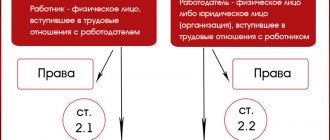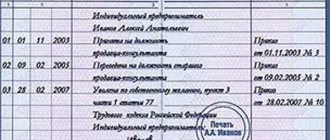Article 331. The right to engage in teaching activities
Persons who have an educational qualification are allowed to engage in teaching activities, which is determined in the manner established by the standard regulations on educational institutions of the relevant types and types, approved by the Government of the Russian Federation.
The following persons are not allowed to engage in teaching activities:
deprived of the right to engage in teaching activities in accordance with a court verdict that has entered into legal force;
have or have had a criminal record, are or have been subject to criminal prosecution (except for persons against whom criminal prosecution was terminated on rehabilitative grounds) for crimes against life and health, freedom, honor and dignity of the individual (with the exception of illegal placement in a psychiatric hospital, slander and insult ), sexual integrity and sexual freedom of the individual, against family and minors, public health and public morality, the foundations of the constitutional order and state security, as well as against public safety;
(as amended by Federal Law dated April 1, 2012 N 27-FZ)
having an unexpunged or outstanding conviction for intentional grave and especially grave crimes;
recognized as legally incompetent in accordance with the procedure established by federal law;
having diseases included in the list approved by the federal executive body exercising the functions of developing state policy and legal regulation in the field of healthcare.
(Part two as amended by Federal Law dated December 23, 2010 N 387-FZ)
Labor legislation on the specifics of labor regulation and the procedure for concluding an employment contract with teaching and research workers
Features of labor regulation and the procedure for concluding an employment contract with teaching and research workers are regulated by Chapter 52 “Features of labor regulation of teaching staff” of the Labor Code:
- Article 331 “The right to engage in teaching activities”;
- Article 331.1 “Peculiarities of removal from work of teaching staff”;
- Article 332 “Peculiarities of concluding and terminating an employment contract with employees of organizations carrying out educational activities in the implementation of educational programs of higher education and additional professional programs”;
- Article 333 “Duration of working hours of teaching staff”;
- Article 334 “Annual basic extended paid leave”;
- Article 335 “Long-term leave of teaching staff”;
- Article 336 “Additional grounds for termination of an employment contract with a teaching employee”
and Chapter 52.1 “Features of labor regulation of scientists, heads of scientific organizations, and their deputies” of the Labor Code:
- Article 336.1 “Peculiarities of concluding and terminating an employment contract with a researcher”;
- Article 336.2 “Head of a scientific organization, deputy heads of a scientific organization”;
- Article 336.3 “Additional grounds for termination of an employment contract with the head, deputy head of a scientific organization.”
Conclusion of an employment contract with teaching and research workers
The specifics of work determine special requirements for the level of professional qualifications, health status, as well as for the general culture of teaching staff, which also determines, along with general ones, the establishment of special requirements when concluding an employment contract with them.
According to Article 331 “The right to engage in teaching activities” of the Labor Code:
- Persons with an educational qualification are allowed to engage in teaching activities, which is determined in the manner established by Federal Law No. 273-FZ of December 29, 2012 “On Education in the Russian Federation” (as amended on March 7, 2018).
Part 2 of Article 332 “Features of concluding and terminating an employment contract with employees of organizations engaged in educational activities for the implementation of educational programs of higher education and additional professional programs” of the Labor Code:
- establishes the procedure for filling positions of teaching staff,
- as well as transfer to such a position in an organization carrying out educational activities to implement educational programs of higher education and additional professional programs, under an employment contract ,
- which is preceded by election by competition to the relevant position.
The positions of teaching staff in universities for which election is carried out by competition include the following positions:
- professors,
- associate professor,
- senior teacher,
- teacher and assistant.
The competition is defined as the optimal way to identify its participants’ maximum (highest) labor and creative achievements, skills and abilities within the required specialty and qualifications by comparing their business qualities and making a secret ballot decision of the academic council of the university (faculty) to elect the best of them.
The following are considered to have successfully completed the competition:
- the candidate who received the largest number of votes from members of the academic council,
- but not less than half plus one vote from the number of those who took part in the vote
- with a quorum of at least 2/3 of the list of members of the Academic Council.
Based on the results of the competition, the rector issues an order approving the decision of the academic council and, on the basis of the act of election, concludes an employment contract with the elected person .
Part 11 of Article 332 “Features of concluding and terminating an employment contract with employees of organizations engaged in educational activities for the implementation of educational programs of higher education and additional professional programs” of the Labor Code provides for:
- that the positions of the dean of the faculty and the head of the department are elective ;
- the dean heading the faculty of the educational organization of higher education and the head of the department are elected in the manner determined by the charter of the educational organization of higher education;
- elections for these positions, as well as a competition, are carried out by secret ballot from among the most qualified and reputable workers with academic degrees and academic titles;
- the decision of the academic council on the election (act of election) of the dean or head of the department is approved by order of the rector of the university;
- Based on the results of elections for the position of dean or head of the department, an employment contract is concluded with the elected person, his enrollment in the corresponding position is carried out by order of the rector.
Employment contracts for filling positions of scientific and pedagogical workers in an educational organization of higher education:
- may be concluded for an indefinite period,
- and for the period determined by the parties to the employment contract.
Concluding an employment contract with rectors and vice-rectors of universities
Some features are inherent in concluding an employment contract with rectors and vice-rectors of universities:
- age of 65 can apply for the positions of rectors, vice-rectors, heads of branches (institutes) in state and municipal educational organizations of higher education ;
- however, upon the recommendation of the academic council of the university, the founder or the body performing the functions of the founder has the right to extend the term of office of the rector until he reaches the age of 70 years;
- and the rector has the right, accordingly, to extend the term of office of the vice-rector, the head of the branch, also until they reach the age of 70 years .
The head of the educational organization is elected:
- general meeting or conference of employees
- with subsequent approval by the founder of the educational organization or appointed by the founder of the educational organization, the President of the Russian Federation or the Government of the Russian Federation in cases established by federal laws.
In accordance with Part 14 of Article 332 “Peculiarities of concluding and terminating an employment contract with employees of organizations engaged in educational activities for the implementation of educational programs of higher education and additional professional programs” of the Labor Code:
- A fixed-term employment contract is concluded with vice-rectors for the term of office of the rector.
To occupy positions assigned to the management staff of an educational organization of higher education and their structural divisions, as well as positions of the teaching staff of educational organizations of higher education:
- should be based on increased qualification requirements, including:
- higher professional education,
- academic titles.
availability of academic degrees and
Termination of an employment contract with teaching staff
At the same time, it should be borne in mind that the law provides for a number of restrictive norms that prohibit hiring as teaching staff in a number of cases.
So, for example, in accordance with Part 2 of Article 331 “The right to engage in teaching activities” of the Labor Code:
- Persons recognized as legally incompetent in accordance with the procedure established by federal law are not allowed to engage in teaching activities;
- Persons for whom it is prohibited by a court verdict or for medical reasons are not allowed to engage in teaching activities,
- as well as persons who have been convicted of certain crimes.
Lists of relevant medical contraindications and crimes are established by law:
- One of the types of punishments provided for by the Criminal Code of the Russian Federation is deprivation of the right to hold certain positions or engage in certain activities.
Article 47 “Deprivation of the right to hold certain positions or engage in certain activities” of the Criminal Code of the Russian Federation (as amended on April 25, 2018)
- for example, on the basis of Article 15 of the Federal Law of July 25, 2002 No. 114-FZ “On Combating Extremist Activities,” a court decision may restrict access to work in educational organizations to a citizen who has participated in extremist activities;
- deprivation of the right to hold certain positions or engage in certain activities is established by the Criminal Code of the Russian Federation for a period of 1 to 5 years as the main type of punishment and for a period of 6 months to 3 years as an additional one;
- in cases specifically provided for by the relevant articles of the special part of the Labor Code, deprivation of the right to hold certain positions or engage in certain activities is established for a period of up to 20 years as an additional type of punishment (Part 2 of Article 47 of the Criminal Code of the Russian Federation);
- if a teacher is deprived of the right to engage in teaching activities for, for example, 5 years, he cannot engage in it in educational institutions;
- with teaching staff who are prohibited by a court verdict from engaging in teaching activities, the employment contract is terminated on the basis of clause 4, part 1, article 83 of the Labor Code.
Clause 4 Part 1 Article 83 “Exemption from serving a sentence due to the expiration of the statute of limitations for a court conviction” of the Labor Code
In addition to the grounds provided for by the Labor Code, termination of an employment contract with teaching staff may be carried out on additional grounds provided for in Article 336 of the Labor Code.
Article 336 “Additional grounds for termination of an employment contract with a teaching employee” of the Labor Code
These additional grounds for terminating an employment contract with teaching staff include the following:
- repeated gross violation of the charter of an organization carrying out educational activities within one year;
- the use, including one-time use, of educational methods associated with physical and (or) mental violence against the personality of the student or pupil;
- reaching the age limit for holding the relevant position in accordance with Article 332 of the Labor Code.
Article 332 “Features of concluding and terminating an employment contract with employees of organizations engaged in educational activities for the implementation of educational programs of higher education and additional professional programs” of the Labor Code
If you have any questions about the violation of your rights, or you find yourself in a difficult life situation, then an online duty lawyer is ready to advise you on this issue for free.
RECRUITMENT. EMPLOYMENT CONTRACT
Article 333. Duration of working hours of teaching staff
For teaching staff, a reduced working time of no more than 36 hours per week is established.
(as amended by Federal Law No. 90-FZ of June 30, 2006)
The teaching load of a teaching worker, stipulated in an employment contract, may be limited by an upper limit in cases provided for by the standard regulations on an educational institution of the appropriate type and type, approved by the federal executive body authorized by the Government of the Russian Federation, and for educational institutions implementing military professional educational programs, and educational institutions implementing educational programs containing information constituting state secrets - standard regulations on educational institutions approved by the Government of the Russian Federation.
(as amended by Federal Laws dated June 30, 2006 N 90-FZ, dated July 23, 2008 N 160-FZ)
Depending on the position and (or) specialty of teaching staff, taking into account the characteristics of their work, the duration of working time (standard hours of teaching work per wage rate) is determined by the federal executive body authorized by the Government of the Russian Federation.
(as amended by Federal Laws dated June 30, 2006 N 90-FZ, dated July 23, 2008 N 160-FZ)
Final provisions
6.1. Disputes between the Parties arising during the execution of this employment contract are considered in the manner established by the Labor Code of the Russian Federation and other federal laws.
6.2. In all other respects that are not provided for in this employment contract, the Parties are guided by the legislation of the Russian Federation governing labor relations.
6.3. The employment contract is concluded in writing, drawn up in two copies, each of which has equal legal force. All changes and additions to this employment contract are formalized by a bilateral written agreement.
6.4. This employment contract may be terminated on the grounds provided for by current labor legislation.
Diseases incompatible with work in education
In 2006, the Labor Code of the Russian Federation was supplemented with the provision that persons with diseases specified in the approved list are not allowed to work in educational institutions.
To date, this list has not been created by legislators; therefore, they are guided by the list of psychiatric diseases for which activities associated with increased danger are contraindicated, and the instructions of the USSR Ministry of Health on the ban on working with children for persons with an open form of tuberculosis.
To determine whether they are unfit for psychiatric reasons, professional teachers must undergo an examination every 5 years. Other diseases, including infectious and contagious diseases, are identified during an annual examination, the results of which are entered into the employee’s personal medical record.
Requirements for teachers
The requirements for a teacher are not limited to professional ones. Society expects from him high moral qualities, intelligence, culture, erudition and sociability.
While all teaching activities are classified and assessed according to a strictly established system, part of it is based on the ability to create and improvise in the learning process. Not everyone is born with the talent of a teacher and creator. But you can develop the required pedagogical abilities:
- organizational;
- scientific and educational;
- didactic;
- communicative;
- perceptual-suggestive;
- research.
A big role in education and upbringing is played by the human qualities of a teacher, such as emotional sensitivity, goodwill, optimism, hard work and patience. Students, their parents and the management of the educational institution require only positive personality qualities from the teacher.
What is criminal prosecution
The fact of criminal prosecution becomes an insurmountable obstacle for a person when finding employment in the field of education. The fact of persecution is said to occur when a criminal case has been initiated against a specific person.
It may be closed for objective reasons. The law also provides for cases when a crime is reclassified from criminal to administrative.
There is a difference between “persecution” and “affair.” The criminal case may continue because a crime has occurred, but the suspect is exempt from prosecution due to his innocence. Only the court finds a citizen of the Russian Federation guilty or removes criminal prosecution from him. Therefore, a court decision is the basis for a ban on engaging in teaching activities or for reinstatement of a teacher in his rights.
Expert explanation on the timing of application of the professional standard
The question of the timing of the implementation of the professional standard for teachers is addressed in letter No. 08-241 dated March 3, 2015 of the Ministry of Education and Science of the Russian Federation. In particular, it was ordered not to apply the norms of the professional standard to the teaching staff of organizations conducting educational activities until January 1, 2017.
Accordingly, new requirements for qualifications, certification, and professional training of teachers in accordance with professional standards will be fully introduced only from 2020.
The letter was certified by the Director of the Department A.V. Zyryanova.
Example 1. Part-time work as a teacher
E.V. Polenova, while having a main job at school (full-time), works part-time in another educational organization. In the second organization, a separate employment contract was concluded with her. In total, she works 54 hours a week (36 main + 18 additional).
Refusal to hire a teacher
To find employment in an educational institution, applicants apply directly to the employer or employment service. The presence of a vacancy and a referral for an interview from a recruitment agency do not guarantee getting a job. In this case, the candidate for a vacant position has the right to request a refusal from the employer in writing.
If employment did not take place for subjective reasons and in violation of the Labor Code of the Russian Federation, this can be appealed in court. All reasons for refusal that are not related to the candidate’s business qualities may be disputed.
All reasons provided for in Art. are considered legitimate. 331 Labor Code of the Russian Federation.
You cannot refuse to conclude an employment contract:
- citizens with a previously agreed transfer from another educational institution;
- young specialists if they have an application from the educational institution that allocated them;
- disabled people assigned to vacant positions against a quota.
Positions of employees in the educational sector
The positions of education workers are distributed at three levels:
- Leaders: directors, chiefs, managers.
- Educators: teachers, lecturers, psychologists, speech therapists, methodologists and others.
- Support staff: duty officer, secretary, assistant teacher, etc.
Support staff are not required to have pedagogical education.
Depending on the level of the position held, employees must meet certain qualification requirements, which are verified by regular certifications.










